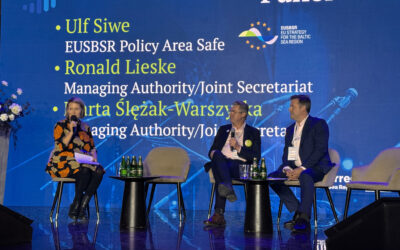
23 April 2025
Project platforms: powering up cooperation across the Baltic Sea region
Written by Elena Kolosova
From climate resilience to mental health, project platforms transform stand-alone solutions into true powerhouses of cooperation. These capitalisation initiatives, labelled Operations of Strategic Importance in Interreg Baltic Sea Region, connect project results, build bridges across programmes, and drive meaningful change throughout the Baltic Sea region.
Collaboration is at the heart of the Baltic Sea region. And now, with the launch of our project platforms, we’re taking it to the next level.
This first group of powerhouse project platforms is our Programme’s main capitalisation tool. They play a vital role in advancing the achievement of our Programme objectives by consolidating results from Interreg Baltic Sea Region projects and other funding programmes. By boosting knowledge transfer and influencing policies, they turn collaboration into lasting impact, helping communities thrive, protecting our shared environment, and paving the way for a greener and more resilient Baltic Sea region.
So, what makes project platforms stand out?
Whether it’s sustainable mobility, coastal resilience, or energy efficiency, project platforms provide structured access to results and empower public authorities and experts to use those practical solutions in daily management and project findings in policies.
Together, the eight project platforms are building on the outcomes of more than 100 projects. More than half of these originate from Interreg Baltic Sea Region, forming the backbone of the project platforms and providing a strong basis for capitalisation within our Programme. By tapping into this wealth of knowledge, the project platforms consolidate proven solutions that help public authorities, communities, and businesses implement change more effectively. This broad foundation gives the project platforms their unique potential to scale up impact across the Baltic Sea region.
Their openness to cooperation beyond our Programme makes these project platforms even more powerful. Each project platform connects with projects from other programmes, like other Interreg programmes in the region and beyond, Horizon, LIFE, and national initiatives, to share knowledge and create synergies. By connecting with the EU Strategy for the Baltic Sea Region (EUSBSR) and engaging with expert networks like HELCOM and Northern Dimension Partnerships, the project platforms help ensure their efforts complement broader regional priorities. This amplifies the impact of Interreg Baltic Sea Region projects, supports shared objectives across the macro-region, and strengthens alignment with Europe-wide goals.
Here’s a quick look at the eight project platforms selected so far, and how they’re already making a difference:
BSR Mental Health – strengthening mental well-being in the region
Lead partner: Secretariat of the Northern Dimension Partnership in Public Health and Social Well-Being (Sweden)
EUSBSR: policy area Health
BSR Mental Health addresses mental health challenges by fostering transnational collaboration among public authorities, health professionals, and NGOs. The project platform highlights the role of non-clinical interventions, such as cultural, artistic, and physical activities in improving social well-being. It strengthens links with the results of EU4Health and national funding and connects to Interreg Central Baltic and Swedish Institute projects.
REAVES – resilient ecosystems for audio-visual and media entrepreneurs
Lead partner: BGZ Berlin International Cooperation Agency GmbH (Germany)
EUSBSR: policy area Culture
REAVES supports entrepreneurs in the film, gaming and music sectors. Together with regional authorities, universities and business support organisations, the project platform creates a robust ecosystem focused on talent retention and innovation through cross-regional and cross-sectoral efforts, ensuring a sustainable future for the creative industry. It consolidates results from projects of Interreg Baltic Sea Region and other Interreg programmes (Aurora, Öresund-Kattegat-Skagerrak, Central Baltic, South Baltic) as well as Creative Europe, Erasmus+, Horizon, and EEA + Norway grants.
RegenT – regenerative practices in nature and cultural tourism
Lead partner: Novia University of Applied Sciences (Finland)
EUSBSR: policy area Tourism
RegenT tackles the dual challenge of climate change and tourism’s impact on our region. While tourism depends on the region’s natural and cultural assets, it must also play a role in their restoration. The project platform equips local and regional authorities, sectoral agencies, and NGOs with essential resources to accelerate the transition to regenerative tourism. By integrating results of Interreg projects from Interreg Baltic Sea Region, North Sea Region, South Baltic and Latvia-Lithuania, RegenT empowers local communities to extend tourism beyond peak seasons.
Baltic PlaNet – coastal resilience in a changing climate
Lead partner: Helmholtz-Zentrum Hereon GmbH (Germany)
EUSBSR: policy areas Spatial Planning and Secure
Baltic PlaNet supports municipalities in addressing growing climate change threats, like heavy precipitation, coastal flooding, and intense storms. It helps them integrate extreme weather considerations into spatial planning while preserving natural and urban environments. It consolidates project results from Interreg Baltic Sea Region, Interreg Latvia-Lithuania, Swedish Institute, LIFE, and European Maritime, Fisheries and Aquaculture Fund.
HAZGONE – tackling hazardous substances at all levels
Lead partner: Riga State City Municipality (Latvia)
EUSBSR: policy area Hazards
Paving the way for a more integrated strategy, HAZGONE connects downstream and upstream measures for cleaning up water polluted by hazardous substances and micropollutants, like pharmaceutical residues and PFAS, and preventing pollution at the source. By bringing together results from Interreg Baltic Sea Region and Central Baltic, LIFE, and Horizon, the project platform enables municipalities and their key departments, responsible for water, chemicals, circularity, and climate, to manage hazardous substances effectively.
SEABAS – smart maritime spatial planning for biodiversity
Lead partner: Baltic Marine Environment Protection Commission – Helsinki Commission (Finland)
EUSBSR: policy area Spatial Planning
SEABAS focuses on ecosystem-based maritime spatial planning (MSP), helping authorities strike a balance between human activities at sea and nature conservation and biodiversity, which is further challenged by climate change. The project platform supports national authorities in aligning MSP practices with sustainable marine resource use principles, bolstering resilience to climate change, and safeguarding ecosystem health. It integrates outcomes from projects funded by Interreg Baltic Sea Region and Central Baltic, Horizon, European Maritime, Fisheries and Aquaculture Fund.
EnTRA – energy transition for a climate-neutral region
Lead partner: HafenCity University Hamburg (Germany)
EUSBSR: policy area Energy
EnTRA connects local and regional authorities working toward the energy transition and helps them consistently develop and maintain adequate energy transition strategies. Through a self-audit guide, mentoring, and an institutional ambassador programme, the project platform ensures the energy transition knowledge is well anchored in relevant institutions. It synthesises technical and governance tools developed by projects of Interreg Baltic Sea Region, Interreg North Sea Region, Interreg Central Europe, Horizon, and national initiatives.
BSR Urban Mobility – active and efficient urban mobility
Lead partner: City of Turku (Finland)
EUSBSR: policy areas Transport and Spatial Planning
BSR Urban Mobility equips cities, regional authorities, and policymakers with tools and best practices on sustainable, active and efficient urban mobility, and helps them implement multimodal transport solutions, zero-emission mobility, and data-driven decision-making. It builds on project results from Interreg Baltic Sea Region, Horizon, JPI Urban Europe and national initiatives.
Want to follow their progress? As the project platforms are contracted, they’ll be added to our project library, where you’ll find their latest updates, events, and first results.
More recent news
Climate-neutral future at hand for Baltic Sea region cities
Turning a city into a climate-neutral one requires knowledgeable people, thorough planning and solid financial resources. But how can cities manage this transition smoothly? The Interreg project Climate-4-Case guides cities around the Baltic Sea on how to do that right.
Designing Interreg Baltic Sea Region that belongs to everyone
10 December 2025 Designing Interreg Baltic Sea Region that belongs to everyone Written by Eeva Rantama What if the next Interreg Baltic Sea Region...
Monitoring the Programme’s progress: transnational cooperation in the making
Representatives from nine Programme area countries gathered in Berlin on 19-20 November 2025 to review the progress of the Programme’s implementation and start preparing for the post-2027 period.
Beyond Borders: Turning Interreg Results into Policy Action
At this year’s EUSBSR Annual Forum in Sopot, the session “Beyond Borders: Interreg Results in Action for a Resilient and Safe Baltic Sea Region” showcased how Interreg Baltic Sea Region projects are transforming challenges into policy-relevant results that strengthen resilience, safety, and cooperation across the region. The session brought together project partners, EUSBSR policy area coordinators, members of the Programme Monitoring Committee and young participants to explore what it takes to turn project outcomes into lasting policy impact.






